Introduction
Any country’s energy industry is impacted by an array of specific factors induced by the political environment, social and economic situation, as well as the geographical position, resource availability, and environmental issues. Alternatively, different economic sectors have their own particularities that predetermine their capabilities in a given market, opportunities for long-term and short-term development, challenges, and threats.
Within this context, the Nigerian oil and gas industry has its specific features. They include the availability of natural resources in the country, the governmental interest in advancing this sector, international cooperation, investment, environmental protection issues, and the leading position in Africa. All these factors constitute a context for Nigeria’s oil and gas industry’s existence. This report uses the method of critical analysis and qualitative evaluation to identify Nigeria’s oil and gas industry’s prospects for the future, current gains, challenges, and opportunities, as well as assess the quality of applied environmental efforts to industry performance regulation. The implications of this report’s findings might be relevant to the stakeholders in the oil and gas industry within the analyzed country and for outside interested parties. The results might be used as guidelines for improvement in the future.
Overview of Nigeria’s Oil and Gas Industry
The Nigerian oil and gas industry is a substantial source of Nigeria’s national economy since it is considered a budget-forming sector. Oil was discovered here in 1956 and since then has been used for commercial purposes (Abu, Aun and Oluwasanmi, 2018). Since Nigeria was a British colony at that time, it fully depended on the technological support and operational regulation of the external parties. After the country became an independent state, its oil and gas operations remained particularly reliant on external actors. In particular, the industry is comprised of such major stakeholders as “Nigerian Bitumen Company, British Colonial Petroleum, Shell D’Arcy (later Shell-BP), Mobil Oil, Elf, Agip, and Phillips through foreign direct investment and multinational partnerships” (Abu, Aun and Oluwasanmi, 2018, p. 50). Thus, the industry obtains a substantial investment share, which helps drive the national economy.
According to the U. S. Energy Information Administration (2020), Nigeria is the leading producer of oil in the African continent; its economy particularly depends on crude oil resources, which are leading in Africa, and liquid gas resources, which are actively exported. As another statistical source indicates, Nigeria’s oil and gas industry accounts for “more than 90% of the country’s exports and 80% of the federal government’s revenue” (Mordor Intelligence, 2021, para. 10). Given such a high level of importance of this industry in the country, its growth is rather noticeable. Indeed, “Nigeria’s crude oil and natural gas exports earned $55 billion in 2018, which is $23 billion higher than in 2016” (U. S. Energy Information Administration, 2020, p. 1). These numbers demonstrate that the oil and gas sector has a significant socio-economic and geo-political impact on the role the country plays in the global community.
Indeed, the oil and gas sector in Nigeria rapidly develops with stable growth in production rates. According to the annual report of the national oil and gas agency, the rate of annual growth in the industry is estimated at 1%, which promises a steady development with due advancements in technology and regulations (Department of Petroleum Resources, 2018). An important issue in the adequate functioning of the industry is the supply chain.
In the oil and gas sector, the supply chain “is a complex of relationships involving a myriad of firms operating across the three broad streams in the industry” (Adam et al., 2019, p. 11). These three streams include upstream, which is dealing with exploration, midstream involved in transportation, and downstream that manages marketing and distribution of final products (Adam et al., 2019). Similarly, from the perspective of structural regulation, the oil and gas industry is regulated by the Department of Petroleum Resource, which oversees the performance of three main divisions, namely upstream operations, downstream operations, and service providers. The detailed structure with the regulatory bodies presented is shown in Figure 1.
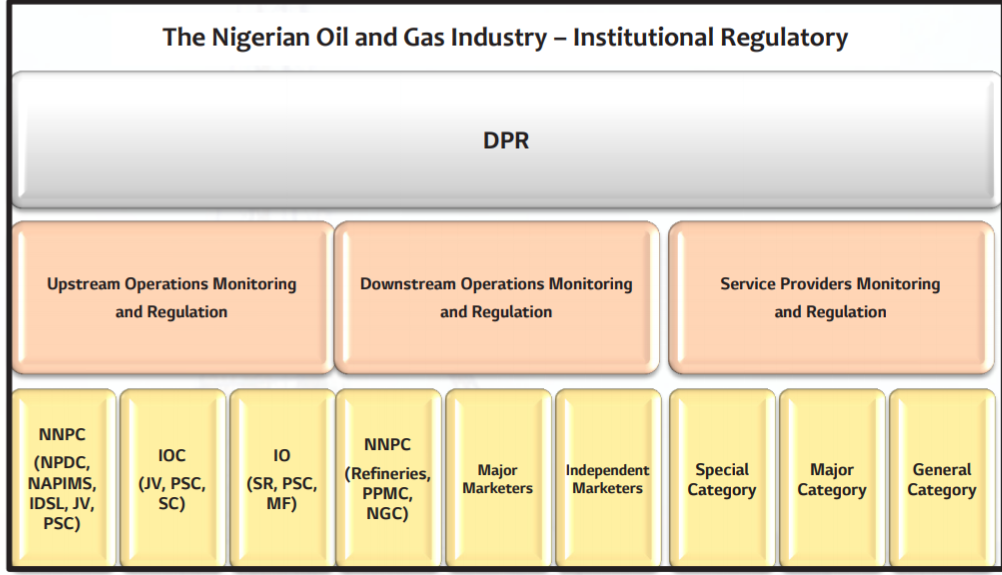
Thus, the overview of the current state of the oil and gas industry of Nigeria demonstrates a solid growth dynamic which is reflected at the level of operations, exportation, and governmental regulation. The volumes and rates of explored and produced crude oil and liquid gas are sufficient not only for the domestic needs but also for export overseas. That is why the oil and gas industry is a pivotal economic entity in Nigeria, which impacts the country’s geo-political status and economic growth.
Industry Analysis
Given the particularities of the country, its decisive governmental direction at the expansion of offshore and internal operations, it is valid to identify the main strategies and models used by Nigeria to promote and develop its oil and gas industry.
Gains
The abundance of crude oil and gas resources in the state and their active utilization for economic and geo-political purposes has triggered acute attention to the regulation and development in this industry. Therefore, primary stakeholders “(governmental agencies, oil companies and host communities), owing to the tangible benefits, consistently strive to ensure that production activities are sustained” (Oyewunmi and Olujobi, 2016, p. 631). Moreover, apart from the strong governmental support and foreign investment, the oil and gas industry managed to gain a large share in the overall economic sectors in the country. As indicated by Abu, Aun, and Oluwasanmi (2018), the contribution of oil sectors into the national economy accounts for over 90%, which demonstrates the high rate of the sector’s development.
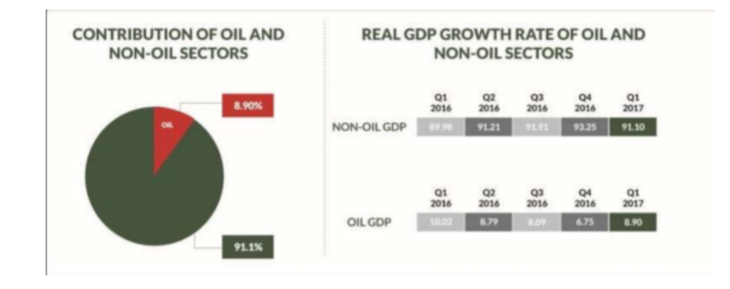
Challenges
While the country has sufficient and even rich crude oil and gas resources and produces enough to meet domestic needs and export to other countries, Nigeria lacks refining and refined oil products for satisfying domestic needs. Indeed, according to U. S. Energy Information Administration (2020), “Nigeria relies on imports of petroleum products to meet domestic demand, importing about 442,000 b/d of petroleum products in 2018” (p. 3). Indeed, there is a small number of local Nigerian refineries, the list of which and their capacities are shown in Figure 3.
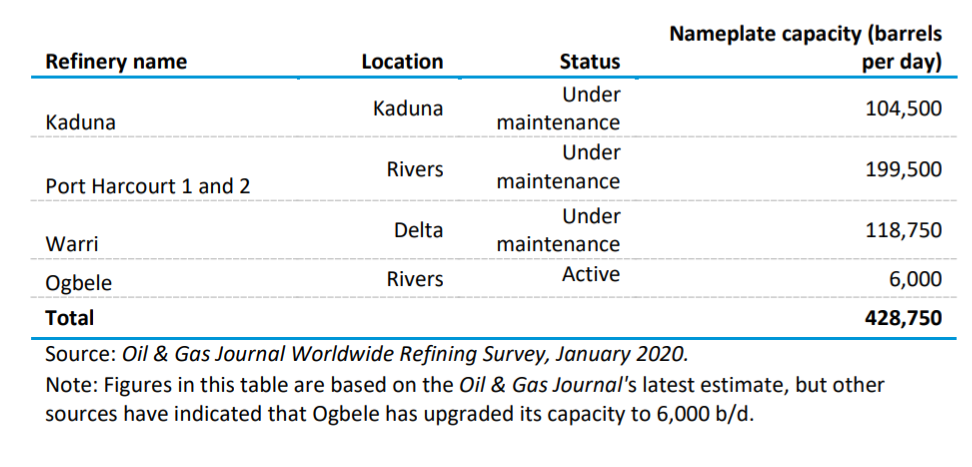
Another challenge that the industry currently faces is the growing competition with other oil and gas industries from competing countries. For example, as indicated by Gold and Devadason (2018), China gradually expands its external influence to the African continent advancing its exporting efforts to Nigeria and other countries. Such a tendency might hinder the opportunities for global expansion and continental dominance of Nigeria. Other challenges include some regulation-related issues, such as “environmental degradation, pipeline vandalization, oil theft/production loss, job loss,” and other factors (Gold and Devadason, 2018, p. 1027).
In addition, Abu, Aun, and Oluwasanmi (2018) identify such challenges as “policy inconsistency, funding, overregulation, security, refined fuel imports, underutilization, and gas flaring” as significant obstructing factors on the way of Nigerian oil and gas industry development (p. 56). Thus, the country lacks regulatory and organizational maintenance of production operations, faces a high level of competition with other countries, and requires policy improvement.
Prospects
Regardless of the challenges that the Nigerian oil and gas sector currently faces, experts foresee some positive advancements in the industry in the future. One of the prospects of the Nigerian oil and gas field is the expansion of production within the planned onshore and offshore projects. As Figure 4 shows, there are five new oil projects planned to be implemented in 2021, 2022, and 2023 with the engagement of different operators and external stakeholders (U. S. Energy Information Administration, 2020). Indeed, the launching of these projects will attract new investment into the state’s economy.
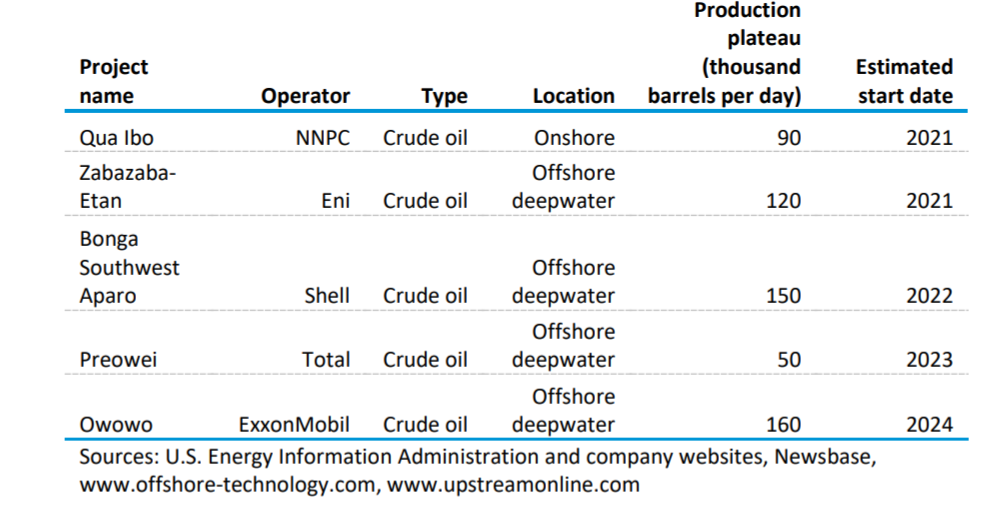
Moreover, Nigeria’s offshore expansion is forecasted to grow, the attraction of new foreign actors to the downstream segment is expected, and advancement into the search of alternative energy sources for long-term energy participation at the global level (Mordor Intelligence, 2021).
Opportunities
Given the outlined situation in the industry, its gains, challenges, and prospects, the country might implement an array of efforts to use the opportunities provided by the economic environment and technological development. In particular, the opportunities might include actions aimed at regulation or deregulation of the sector, opening new facilities, enhancing production, and changes to upstream and downstream operations (Adam et al., 2019). A research study conducted with key stakeholders in the oil and gas industry identified the specific improvement areas that the participants prioritize.
The results of the study are presented in the form of percentages depending on the importance of an improvement opportunity as judged by stakeholders (See Figure 5). Opening new refineries, improving refineries’ maintenance, upgrading maintenance of downstream facilities, and full deregulation of the downstream petroleum sector are some of the most popular improvement paths (Adam et al., 2019). Importantly, the advancement of sustainability policies and environment-friendly production systems is also a significant opportunity to occupy a solid place in the global industry of oil and gas with long-term prospects (Adam et al., 2019; Department of Petroleum Resources, 2018; Faturoti, Agbaitoro and Onya, 2019).
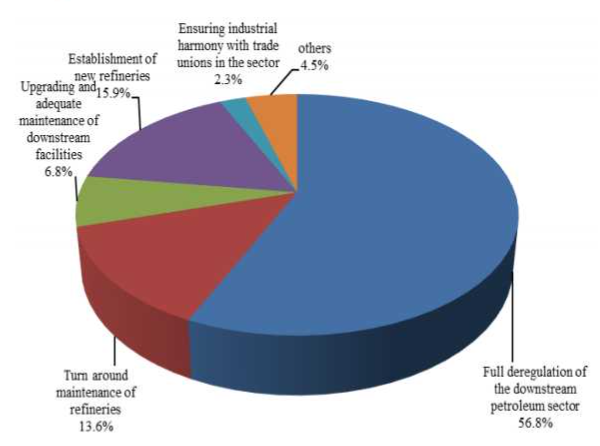
Similarly, cooperation with the leading actors in the global oil and gas industry might be a favorable opportunity for Nigeria. As claimed by Gold and Devadason (2018), China’s direction at global dominance in the energy sector caused the need of the country to expand its resources by engaging in sourcing crude oil and gas from other states. Therefore, Nigeria might use the opportunity to fill the niche of the supplier of natural resources to China, thus establishing itself as a reliable and development-oriented stakeholder in the industry. Similarly, another opportunity is the advancement of entrepreneurial efforts in the industry through specifically designed policies and programs, which would ultimately decrease the now-high unemployment rate in the country (Abu, Aun and Oluwasanmi, 2018). In such a manner, using these opportunities, Nigeria will be able to eliminate the challenges and establish a solid basis for long-term sustainable industry development and overall economic growth.
Critical Evaluation of Environmental Policies, Models, and Strategies in Nigerian Oil and Gas Industry
Officially, the Nigerian government places environmental protection and sustainable economy concerns at the highest rank among other tentative national policies. Indeed, according to the Department of Petroleum Resources (2018), the country’s administration acknowledges that the energy sector is “centered on energy security, sustainability, climate change and impact of global oil markets on developing countries; producers and consumers alike” (p. 9). For that matter, national policies are being launched to advance green production efforts to ensure Nigeria’s competitive advantage in the global oil and gas market, as well as sustain safety for Nigerian citizens.
The implementation of sustainability policies and environmental strategies and programs in Nigeria in general and the oil and gas industry, in particular, is a complex and ambiguous issue. Overall, the states involved in industrial production are expected to ensure safe manufacturing processes to protect the environment and ensure adequate demographic policies (Faturoti, Agbaitoro, and Onya, 2019). However, as stated earlier, the functioning of the oil and gas industry in Nigeria is enabled by the active participation of external stakeholders, such as international oil companies and foreign investors. Therefore, the national policies in relation to oil and gas are dependent on the interests of the external actors, which is why the implementation of strict sustainability policies is hindered (Faturoti, Agbaitoro, and Onya, 2019).
Currently, the environmental policies in Nigeria related to the oil and gas industry lack sufficient transparency and hence clarity (Oyewunmi and Olujobi, 2016). Indeed, the implementation of environmental laws is sporadic and insufficiently addresses the needs of the global community, and fails to protect the domestic environment properly.
Nonetheless, Nigeria steadily advances its environmental policies by affiliating with international programs and regulations. In particular, the country affiliates with the United Nations Environmental Programme (UNEP) by launching an improvement effort to ensure a green economy. However, there are significant challenges as per the implementation of these efforts because “no funds have been released and the necessary institutions needed to supervise the process are yet to be constituted” (Faturoti, Agbaitoro, and Onya, 2019, p. 228). Thus, there are some organizational, economic, and political issues to be resolved before the significant shifts in environmental protection management in the oil and gas industry are achieved.
Although there are significant challenges in sustainability promotion in Nigeria, the government should induce transitioning to stricter environmental policies. The oil and gas industry, unlike other sectors of the economy, is characterized by the fact that its operations first trigger adverse environmental consequences, which then result in negative social and economic impacts (Adam et al., 2019). Therefore, it is essential to integrate “environmental concerns into the entire gamut of a firm’s supply chain” as the core of sustainable production (Adam et al., 2019, p. 12). Moreover, Nigeria should ensure that all the laws and policies within the oil and gas industry are transparent and disclosed properly (Oyewunmi and Olujobi, 2016). Such efforts will help the country improve its green economy efforts and establish its competitive advantage at the global level.
Conclusion
In summation, as the overview of the overall current state of the Nigerian oil and gas industry, its gains, challenges, opportunities, and prospects demonstrated, the country experiences a significant improvement in the energy sector since the exploration of natural resources on its territory. The large volumes of production of crude oil and liquid gas at the upstream stage and its extensive exportation at the downstream stage allow for stable and improving economic gains for the state. However, Nigeria’s inconsistent regulation policies, pipeline vandalism, high rate of unemployment, competition, and other challenges obstruct its smooth transition to the next level of development. Therefore, it is recommended for the industry to engage with more foreign stakeholders, cooperate with potential competitors, expand the energy sector beyond oil and gas, and advance entrepreneurial efforts in the industry to ensure long-term sustainable growth.
As for the environmental policies, models, and strategies, the Nigerian government makes efforts to meet the guidelines of the global community and apply international environmental practices and standards to the local oil and gas industry and other sectors. However, there are significant challenges in the form of the lack of funding, inconsistent policy implementation, and the influence of foreign actors who lead the sector’s development. Moreover, the policies lack transparency, which might have advanced positive shifts toward the improvement of environmental protection at the upstream stage. Thus, Nigeria’s oil and gas industry is currently at a transitioning stage where the development of the oil and gas sector provides opportunities for global expansion, but the lack of maintained sustainability policies obstructs its competitive advantage.
References
Abu, Z., Aun, I.I. and Oluwasanmi, O.O. (2018) ‘Technology transfer and entrepreneurial development in the value chain system of the Nigerian oil and gas industry’, Pacific Journal of Science and Technology, 19(1), pp. 50-54.
Adam, A. et al. (2019) ‘Supply chain sustainability practices of oil servicing firms in the downstream sector of Nigeria’s oil and gas industry’, Journal of Economic Info, 6(4), pp. 11-14.
Department of Petroleum Resources (2018) 2018 Nigerian oil and gas industry annual report. Web.
Gold, K.L. and Devadason, E.S. (2018) ‘The engagement of China in Nigeria’s oil sector: is the transformation positive’, Contemporary Chinese Political Economy and Strategic Relations: An International Journal, 4(3), pp. 1025-1060.
Faturoti, B., Agbaitoro, G. and Onya, O. (2019) ‘Environmental protection in the Nigerian oil and gas industry and Jonah Gbemre v. Shell PDC Nigeria Limited: let the plunder continue?’ African Journal of International and Comparative Law, 27(2), pp. 225-245.
Mordor Intelligence (2021). Nigeria oil and gas market – growth, trends, COVID-19 impact, and forecasts (2021 – 2026). Web.
Oyewunmi, O.A. and Olujobi, O.J. (2016) ‘Transparency in Nigeria’s oil and gas industry: is policy re-engineering the way out’, International Journal of Energy Economics and Policy, 5(4), pp. 630-636.
U. S. Energy Information Administration (2020) Country analysis executive summary: Nigeria. Web.